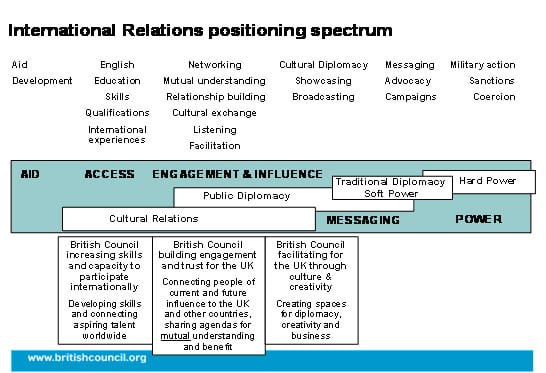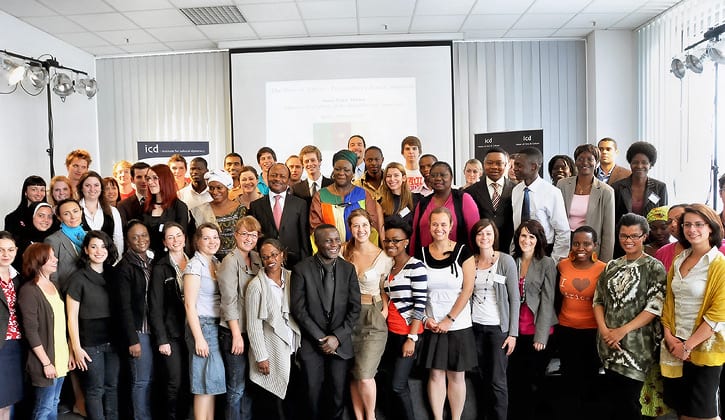In his piece, “Schools, Hospitals or Cultural Relations?” John Worne outlines the “crude version” of the International Relations Positioning Spectrum (IRPS), a continuum that illustrates international relations as falling somewhere between aid and military power. As he defines it, the IRPS is “giving, helping, sharing, boasting, shouting, fighting.”
However, just as people have different conceptions of what “culture” means to them, a (cultural) spectrum, of sorts, can also vary in meaning. For example, Nick Cull, in his response to John Worne’s spectrum, argues that a more appropriate spectrum might fall: “listening – facilitation – exchange – cultural diplomacy – broadcasting – advocacy.” When using this spectrum in analyzing diplomatic efforts, though, understanding Cull’s classification of cultural diplomacy is crucial. As Cull defines it, cultural diplomacy is “an actor’s attempt to manage the international environment through making its cultural resources and achievements known overseas and/or facilitating cultural transmission abroad.” In this sense, his definition most closely aligns with Worne’s “boasting” in the sense that an actor is promoting, or projecting, its own society to others.

Each spectrum, regardless of their respective labeling, contains similarities that are interesting when applied to a case study, such as “Cultural Diplomacy in Africa: A Forum for Young Leaders.” Cultural Diplomacy in Africa: A Forum for Young Leaders (CDA) is a network of students, young professionals, and cultural practitioners from across the world “who share an interest in the African continent.” Housed and run within the Institute for Cultural Diplomacy, the CDA believes in the significance of cultural diplomacy as a tool for policy and uses it to address the challenges currently faced in Africa. Further, the network “conducts ongoing activity aimed at supporting development and strengthening relations between different countries and cultural groups within Africa, and between Africa and external partners…[and] provides an opportunity to network and experience the vibrant city of Berlin.” The Forum’s objectives are defined as follows:
- Establish a long-term, interdisciplinary network of young leaders that contributes on both a professional and personal level to exchange within African states;
- Educate, enhance, and sustain African relationships through the empowerment of the participants;
- Support valuable contributions to civil society in Africa through “Leadership Initiatives” that the young leaders will organize as part of the program;
- Provide the participants with fresh insights and new perspectives to deepen their understanding of the economic, political, cultural, religious, and social frameworks of the African Project; and
- Strengthen professional, economic, cultural, political, and scientific cooperation through close personal and professional relationships.
As is fairly evident in its description (and in its many objectives), the CDA Forum is composed of a number of cultural diplomacy programs and initiatives. First, the CDA Forum greatly focuses on the role of African leaders within its program. These speakers, involved in lectures and discussions include “leading figures from the fields of politics, diplomacy, academia, civil society and representatives from the private sector.” Each speaker is expected to bring his or her own insights on the theme of the Weeklong Seminar. These activities of the Forum seem to fall nicely under Worne’s “sharing” or “boasting” category of the spectrum, but the nature of program will obviously affect the classifications. For example, lectures might align more closely with “boasting,” while discussion-based programs involve more “sharing.” One note of importance is that Worne astutely observes that some words might be better suited for describing various activities than others. For instance, he states, “‘Exchanging’ is perhaps a more accurate term than ‘sharing’ because it is more actively mutual and more purposeful. ‘Telling’ is perhaps fairer than ‘shouting’ to encapsulate diplomacy and campaigning…The intent behind it and the way it is done make the difference.” Therefore, lectures may be better classified as “telling,” since speakers are sharing their insights and experiences, whereas seminars and workshops are more about the mutual exchange of information. In addition to the speakers, the program provides opportunities for the participants to network with other attendees and explore the cities in a new setting. According to ICD’s website, social and cultural activities range from film nights to debates to group dinners to visiting historical sites. Although these visits provide an outlet for the attendees to meet informally with one another, the ICD website clearly notes that during group visits, participants “are able to see the city from a different perspective. They will be able to experience all that Berlin has to offer, as well as partake in visiting Germany’s top institutions, including foreign offices, the city hall, the German parliament, and various embassies throughout the city.”

Looking at the program from this angle shows that the CDA Forum through Institute for Cultural Diplomacy, in addition to supporting efforts aimed at African civil society and its overall development, is also an opportunity to promote the German culture to participants. This element of the Forum’s activities would fall farther to the right of the spectrum—perhaps under boasting or shouting, but what components are necessary before an initiative is classified as ‘shouting’ versus ‘boasting’? Determining whether participants felt like a significant portion of the program was geared toward German society would be interesting to examine within this context. Worne notes in his piece that “at its best, cultural relations means more ‘helping and sharing’, less ‘shouting and fighting’ and maybe one day a less urgent need to ‘give.’
This is a fair point, but it’s difficult to know the relationship between these points within the context of the CDA Forum because there is little knowledge on the CDA Forum’s participants. Although the website classifies them as “students, young professionals and cultural practitioners,” there are great differences between the former category of students and the two latter categories.
Is this Forum primarily composed of students trying to learn and “take it all in,” or is it composed of individuals who can take the knowledge they learn and actually apply it in their home countries? Both classes are extremely important, and relationships need to be built with each group, but there is a difference when considering the short and long-term implications of exchange programs. Ultimately, when looking at the elements of the CDA Forum, each of the tactics could be placed at different points along Worne’s—and along Cull’s—International Relations Positioning Spectrum. The cultural diplomacy elements of the program attempt to build relationships with African leaders, create networks (and lasting relationships) among today’s young leaders, and even promote the German lifestyle and culture through history, tours and dinners.
Although I tend to believe that multidisciplinary initiatives with numerous aims might have a greater chance of success, do multiple aims have the ability to dilute the central, core purpose of an organization or an enterprise? Does the Forum’s focus on multiple areas mean that this particular initiative has a greater or less likelihood of experiencing success, or does the spectrum not matter not matter as much in the grand scheme of things?



1 thought on “Analyzing “Cultural Diplomacy in Africa” through the IR Positioning Spectrum”